An Analysis of Literature Review and Corporate Social Responsibility
VerifiedAdded on 2021/02/18
|9
|2620
|65
Report
AI Summary
This report delves into the concepts of literature review and corporate social responsibility (CSR). It defines literature review, detailing its purpose in research, including enhancing knowledge and managing contradictions. The report then explores CSR, outlining its benefits such as improved business reputation, financial savings, and enhanced customer relationships. It also examines CSR theories, specifically the economic and philanthropic models, and highlights CSR practices like ethical and economic responsibilities. The report concludes by summarizing the key aspects of both literature reviews and CSR, emphasizing their significance in academic and business contexts. The report also provides practical examples to illustrate each concept.

Study Skills for Higher
Education
Education
Paraphrase This Document
Need a fresh take? Get an instant paraphrase of this document with our AI Paraphraser
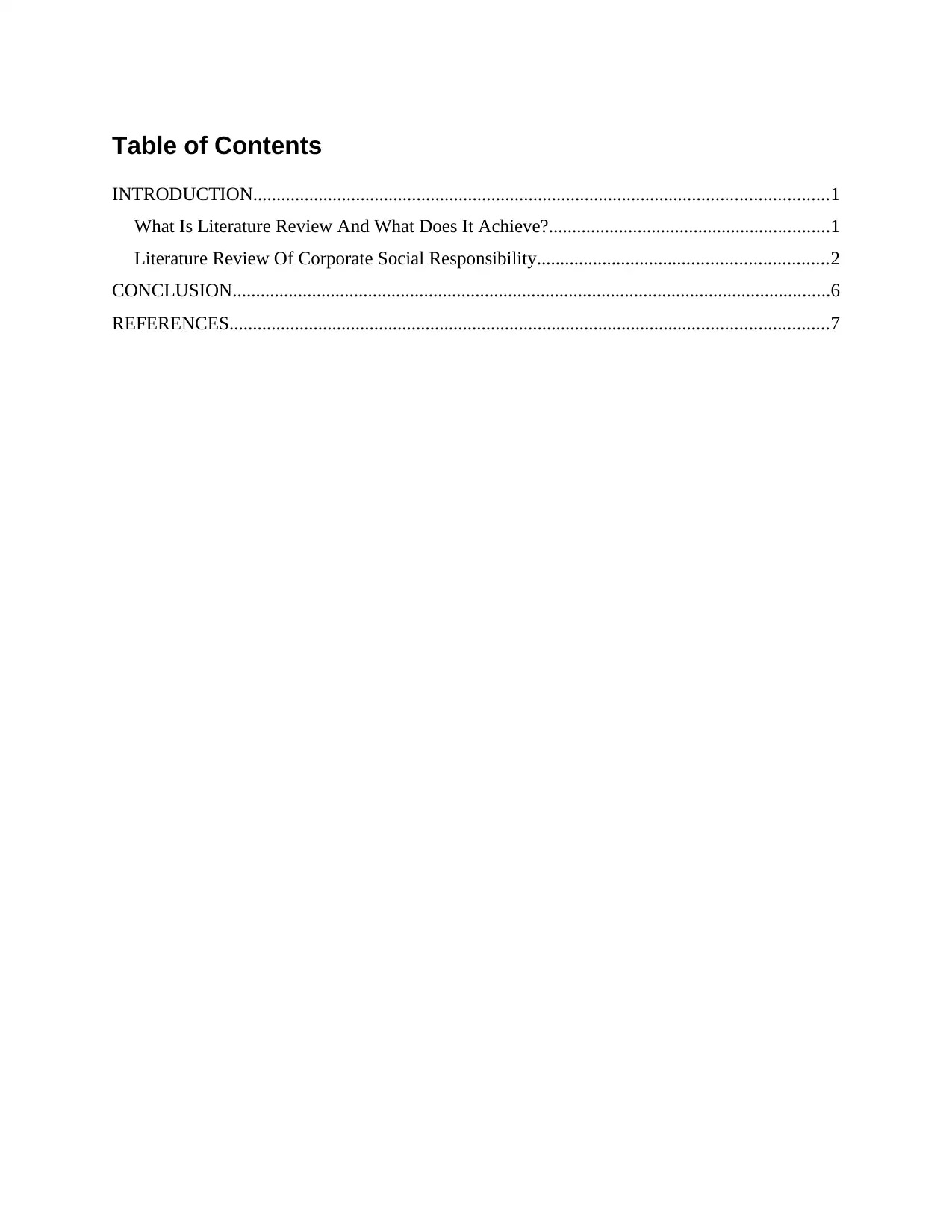
Table of Contents
INTRODUCTION...........................................................................................................................1
What Is Literature Review And What Does It Achieve?............................................................1
Literature Review Of Corporate Social Responsibility..............................................................2
CONCLUSION................................................................................................................................6
REFERENCES................................................................................................................................7
INTRODUCTION...........................................................................................................................1
What Is Literature Review And What Does It Achieve?............................................................1
Literature Review Of Corporate Social Responsibility..............................................................2
CONCLUSION................................................................................................................................6
REFERENCES................................................................................................................................7
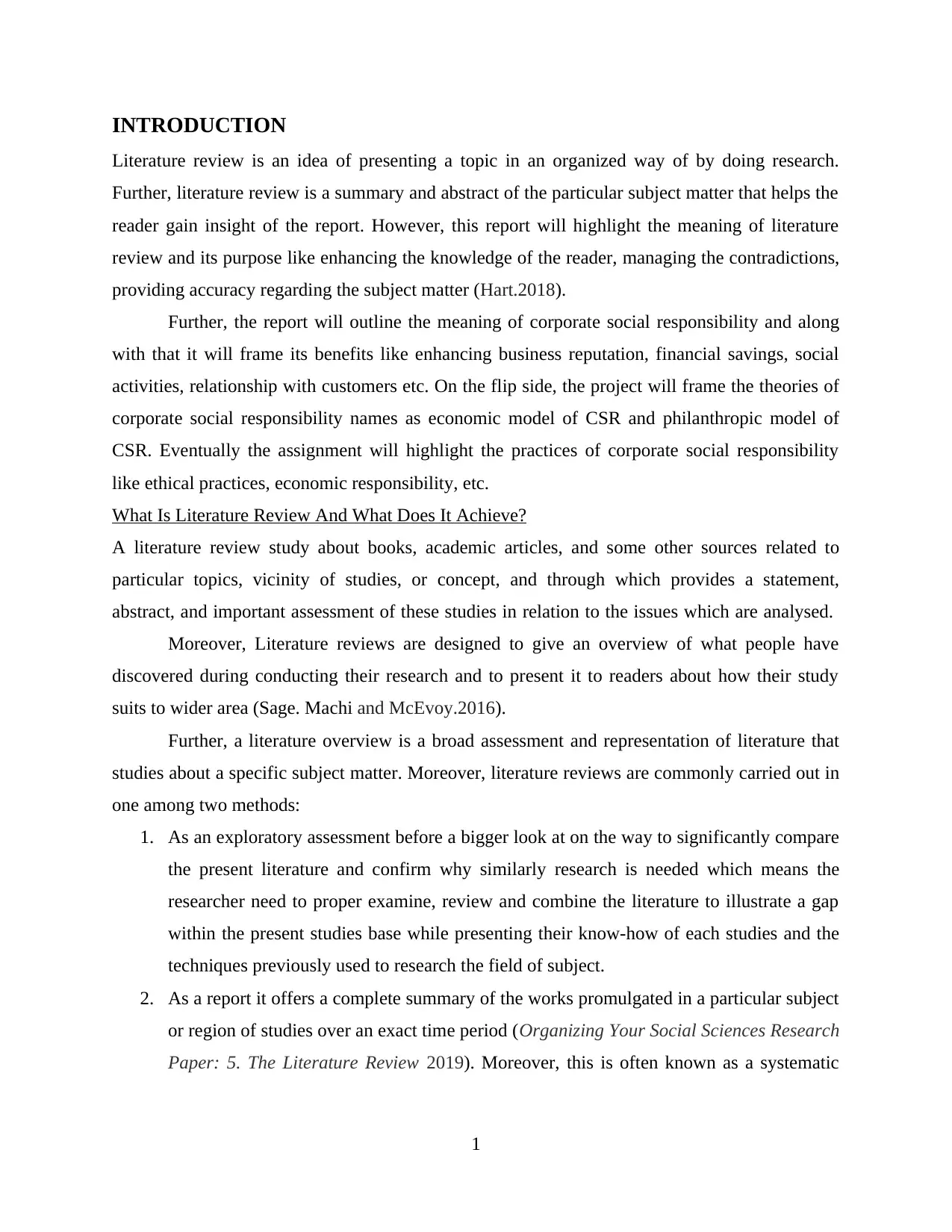
INTRODUCTION
Literature review is an idea of presenting a topic in an organized way of by doing research.
Further, literature review is a summary and abstract of the particular subject matter that helps the
reader gain insight of the report. However, this report will highlight the meaning of literature
review and its purpose like enhancing the knowledge of the reader, managing the contradictions,
providing accuracy regarding the subject matter (Hart.2018).
Further, the report will outline the meaning of corporate social responsibility and along
with that it will frame its benefits like enhancing business reputation, financial savings, social
activities, relationship with customers etc. On the flip side, the project will frame the theories of
corporate social responsibility names as economic model of CSR and philanthropic model of
CSR. Eventually the assignment will highlight the practices of corporate social responsibility
like ethical practices, economic responsibility, etc.
What Is Literature Review And What Does It Achieve?
A literature review study about books, academic articles, and some other sources related to
particular topics, vicinity of studies, or concept, and through which provides a statement,
abstract, and important assessment of these studies in relation to the issues which are analysed.
Moreover, Literature reviews are designed to give an overview of what people have
discovered during conducting their research and to present it to readers about how their study
suits to wider area (Sage. Machi and McEvoy.2016).
Further, a literature overview is a broad assessment and representation of literature that
studies about a specific subject matter. Moreover, literature reviews are commonly carried out in
one among two methods:
1. As an exploratory assessment before a bigger look at on the way to significantly compare
the present literature and confirm why similarly research is needed which means the
researcher need to proper examine, review and combine the literature to illustrate a gap
within the present studies base while presenting their know-how of each studies and the
techniques previously used to research the field of subject.
2. As a report it offers a complete summary of the works promulgated in a particular subject
or region of studies over an exact time period (Organizing Your Social Sciences Research
Paper: 5. The Literature Review 2019). Moreover, this is often known as a systematic
1
Literature review is an idea of presenting a topic in an organized way of by doing research.
Further, literature review is a summary and abstract of the particular subject matter that helps the
reader gain insight of the report. However, this report will highlight the meaning of literature
review and its purpose like enhancing the knowledge of the reader, managing the contradictions,
providing accuracy regarding the subject matter (Hart.2018).
Further, the report will outline the meaning of corporate social responsibility and along
with that it will frame its benefits like enhancing business reputation, financial savings, social
activities, relationship with customers etc. On the flip side, the project will frame the theories of
corporate social responsibility names as economic model of CSR and philanthropic model of
CSR. Eventually the assignment will highlight the practices of corporate social responsibility
like ethical practices, economic responsibility, etc.
What Is Literature Review And What Does It Achieve?
A literature review study about books, academic articles, and some other sources related to
particular topics, vicinity of studies, or concept, and through which provides a statement,
abstract, and important assessment of these studies in relation to the issues which are analysed.
Moreover, Literature reviews are designed to give an overview of what people have
discovered during conducting their research and to present it to readers about how their study
suits to wider area (Sage. Machi and McEvoy.2016).
Further, a literature overview is a broad assessment and representation of literature that
studies about a specific subject matter. Moreover, literature reviews are commonly carried out in
one among two methods:
1. As an exploratory assessment before a bigger look at on the way to significantly compare
the present literature and confirm why similarly research is needed which means the
researcher need to proper examine, review and combine the literature to illustrate a gap
within the present studies base while presenting their know-how of each studies and the
techniques previously used to research the field of subject.
2. As a report it offers a complete summary of the works promulgated in a particular subject
or region of studies over an exact time period (Organizing Your Social Sciences Research
Paper: 5. The Literature Review 2019). Moreover, this is often known as a systematic
1
⊘ This is a preview!⊘
Do you want full access?
Subscribe today to unlock all pages.

Trusted by 1+ million students worldwide
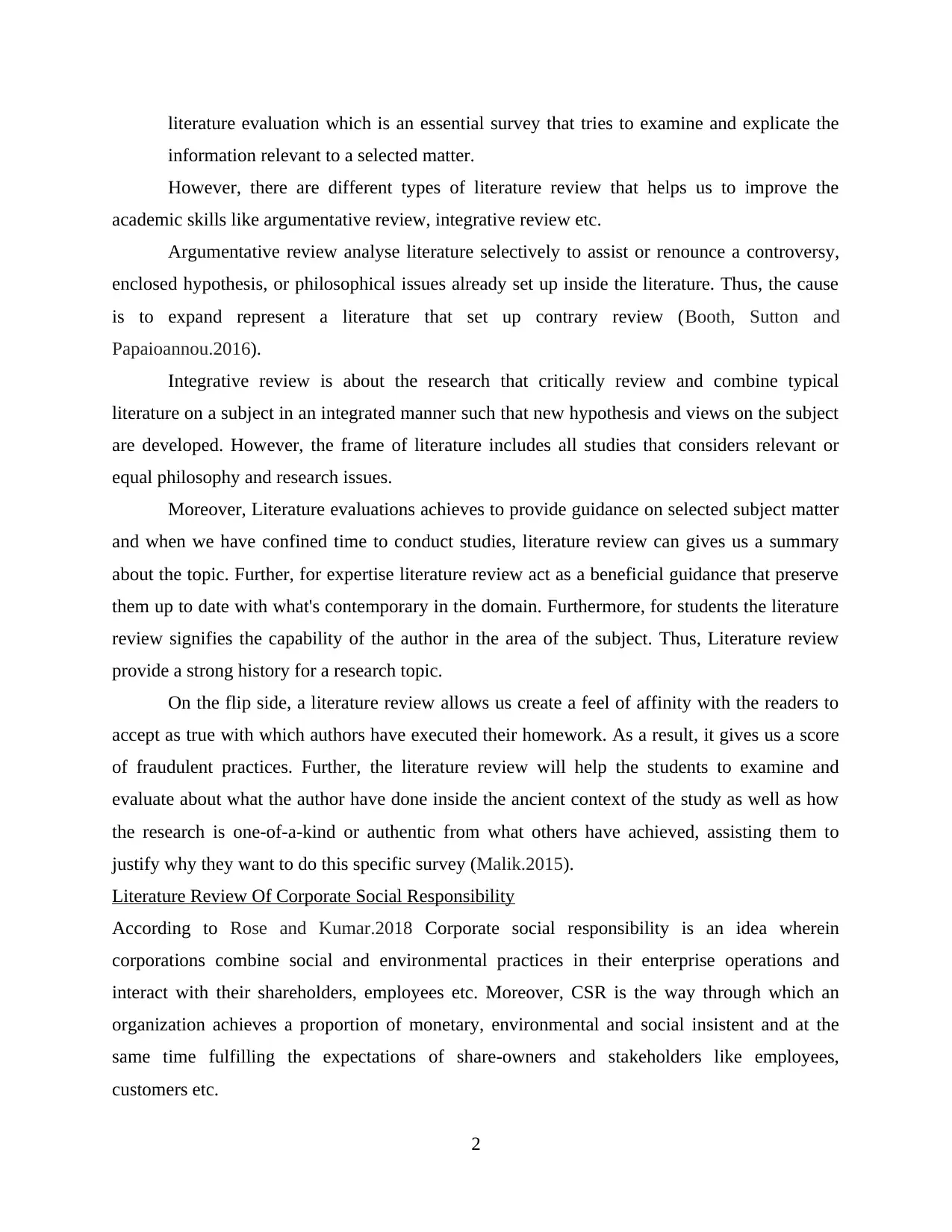
literature evaluation which is an essential survey that tries to examine and explicate the
information relevant to a selected matter.
However, there are different types of literature review that helps us to improve the
academic skills like argumentative review, integrative review etc.
Argumentative review analyse literature selectively to assist or renounce a controversy,
enclosed hypothesis, or philosophical issues already set up inside the literature. Thus, the cause
is to expand represent a literature that set up contrary review (Booth, Sutton and
Papaioannou.2016).
Integrative review is about the research that critically review and combine typical
literature on a subject in an integrated manner such that new hypothesis and views on the subject
are developed. However, the frame of literature includes all studies that considers relevant or
equal philosophy and research issues.
Moreover, Literature evaluations achieves to provide guidance on selected subject matter
and when we have confined time to conduct studies, literature review can gives us a summary
about the topic. Further, for expertise literature review act as a beneficial guidance that preserve
them up to date with what's contemporary in the domain. Furthermore, for students the literature
review signifies the capability of the author in the area of the subject. Thus, Literature review
provide a strong history for a research topic.
On the flip side, a literature review allows us create a feel of affinity with the readers to
accept as true with which authors have executed their homework. As a result, it gives us a score
of fraudulent practices. Further, the literature review will help the students to examine and
evaluate about what the author have done inside the ancient context of the study as well as how
the research is one-of-a-kind or authentic from what others have achieved, assisting them to
justify why they want to do this specific survey (Malik.2015).
Literature Review Of Corporate Social Responsibility
According to Rose and Kumar.2018 Corporate social responsibility is an idea wherein
corporations combine social and environmental practices in their enterprise operations and
interact with their shareholders, employees etc. Moreover, CSR is the way through which an
organization achieves a proportion of monetary, environmental and social insistent and at the
same time fulfilling the expectations of share-owners and stakeholders like employees,
customers etc.
2
information relevant to a selected matter.
However, there are different types of literature review that helps us to improve the
academic skills like argumentative review, integrative review etc.
Argumentative review analyse literature selectively to assist or renounce a controversy,
enclosed hypothesis, or philosophical issues already set up inside the literature. Thus, the cause
is to expand represent a literature that set up contrary review (Booth, Sutton and
Papaioannou.2016).
Integrative review is about the research that critically review and combine typical
literature on a subject in an integrated manner such that new hypothesis and views on the subject
are developed. However, the frame of literature includes all studies that considers relevant or
equal philosophy and research issues.
Moreover, Literature evaluations achieves to provide guidance on selected subject matter
and when we have confined time to conduct studies, literature review can gives us a summary
about the topic. Further, for expertise literature review act as a beneficial guidance that preserve
them up to date with what's contemporary in the domain. Furthermore, for students the literature
review signifies the capability of the author in the area of the subject. Thus, Literature review
provide a strong history for a research topic.
On the flip side, a literature review allows us create a feel of affinity with the readers to
accept as true with which authors have executed their homework. As a result, it gives us a score
of fraudulent practices. Further, the literature review will help the students to examine and
evaluate about what the author have done inside the ancient context of the study as well as how
the research is one-of-a-kind or authentic from what others have achieved, assisting them to
justify why they want to do this specific survey (Malik.2015).
Literature Review Of Corporate Social Responsibility
According to Rose and Kumar.2018 Corporate social responsibility is an idea wherein
corporations combine social and environmental practices in their enterprise operations and
interact with their shareholders, employees etc. Moreover, CSR is the way through which an
organization achieves a proportion of monetary, environmental and social insistent and at the
same time fulfilling the expectations of share-owners and stakeholders like employees,
customers etc.
2
Paraphrase This Document
Need a fresh take? Get an instant paraphrase of this document with our AI Paraphraser
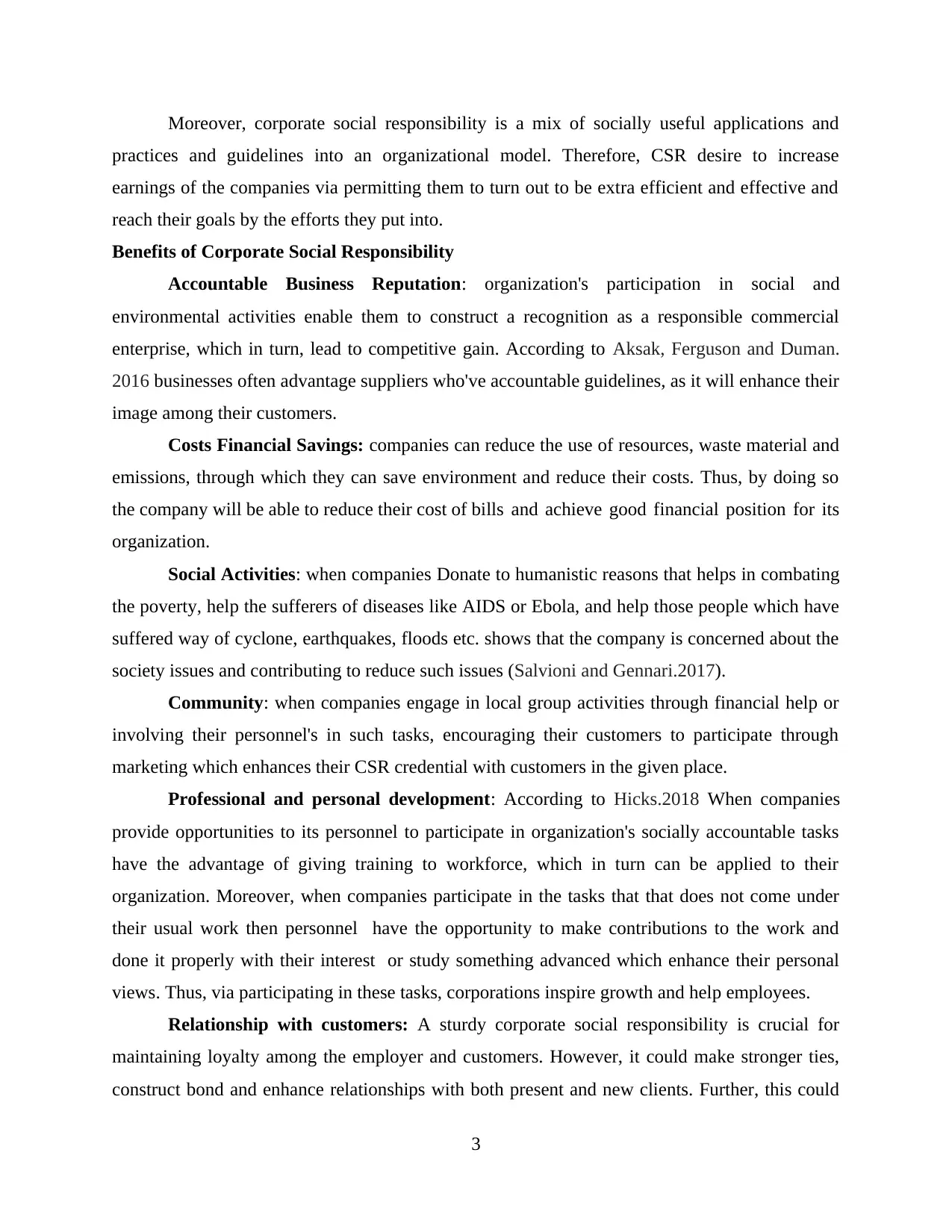
Moreover, corporate social responsibility is a mix of socially useful applications and
practices and guidelines into an organizational model. Therefore, CSR desire to increase
earnings of the companies via permitting them to turn out to be extra efficient and effective and
reach their goals by the efforts they put into.
Benefits of Corporate Social Responsibility
Accountable Business Reputation: organization's participation in social and
environmental activities enable them to construct a recognition as a responsible commercial
enterprise, which in turn, lead to competitive gain. According to Aksak, Ferguson and Duman.
2016 businesses often advantage suppliers who've accountable guidelines, as it will enhance their
image among their customers.
Costs Financial Savings: companies can reduce the use of resources, waste material and
emissions, through which they can save environment and reduce their costs. Thus, by doing so
the company will be able to reduce their cost of bills and achieve good financial position for its
organization.
Social Activities: when companies Donate to humanistic reasons that helps in combating
the poverty, help the sufferers of diseases like AIDS or Ebola, and help those people which have
suffered way of cyclone, earthquakes, floods etc. shows that the company is concerned about the
society issues and contributing to reduce such issues (Salvioni and Gennari.2017).
Community: when companies engage in local group activities through financial help or
involving their personnel's in such tasks, encouraging their customers to participate through
marketing which enhances their CSR credential with customers in the given place.
Professional and personal development: According to Hicks.2018 When companies
provide opportunities to its personnel to participate in organization's socially accountable tasks
have the advantage of giving training to workforce, which in turn can be applied to their
organization. Moreover, when companies participate in the tasks that that does not come under
their usual work then personnel have the opportunity to make contributions to the work and
done it properly with their interest or study something advanced which enhance their personal
views. Thus, via participating in these tasks, corporations inspire growth and help employees.
Relationship with customers: A sturdy corporate social responsibility is crucial for
maintaining loyalty among the employer and customers. However, it could make stronger ties,
construct bond and enhance relationships with both present and new clients. Further, this could
3
practices and guidelines into an organizational model. Therefore, CSR desire to increase
earnings of the companies via permitting them to turn out to be extra efficient and effective and
reach their goals by the efforts they put into.
Benefits of Corporate Social Responsibility
Accountable Business Reputation: organization's participation in social and
environmental activities enable them to construct a recognition as a responsible commercial
enterprise, which in turn, lead to competitive gain. According to Aksak, Ferguson and Duman.
2016 businesses often advantage suppliers who've accountable guidelines, as it will enhance their
image among their customers.
Costs Financial Savings: companies can reduce the use of resources, waste material and
emissions, through which they can save environment and reduce their costs. Thus, by doing so
the company will be able to reduce their cost of bills and achieve good financial position for its
organization.
Social Activities: when companies Donate to humanistic reasons that helps in combating
the poverty, help the sufferers of diseases like AIDS or Ebola, and help those people which have
suffered way of cyclone, earthquakes, floods etc. shows that the company is concerned about the
society issues and contributing to reduce such issues (Salvioni and Gennari.2017).
Community: when companies engage in local group activities through financial help or
involving their personnel's in such tasks, encouraging their customers to participate through
marketing which enhances their CSR credential with customers in the given place.
Professional and personal development: According to Hicks.2018 When companies
provide opportunities to its personnel to participate in organization's socially accountable tasks
have the advantage of giving training to workforce, which in turn can be applied to their
organization. Moreover, when companies participate in the tasks that that does not come under
their usual work then personnel have the opportunity to make contributions to the work and
done it properly with their interest or study something advanced which enhance their personal
views. Thus, via participating in these tasks, corporations inspire growth and help employees.
Relationship with customers: A sturdy corporate social responsibility is crucial for
maintaining loyalty among the employer and customers. However, it could make stronger ties,
construct bond and enhance relationships with both present and new clients. Further, this could
3
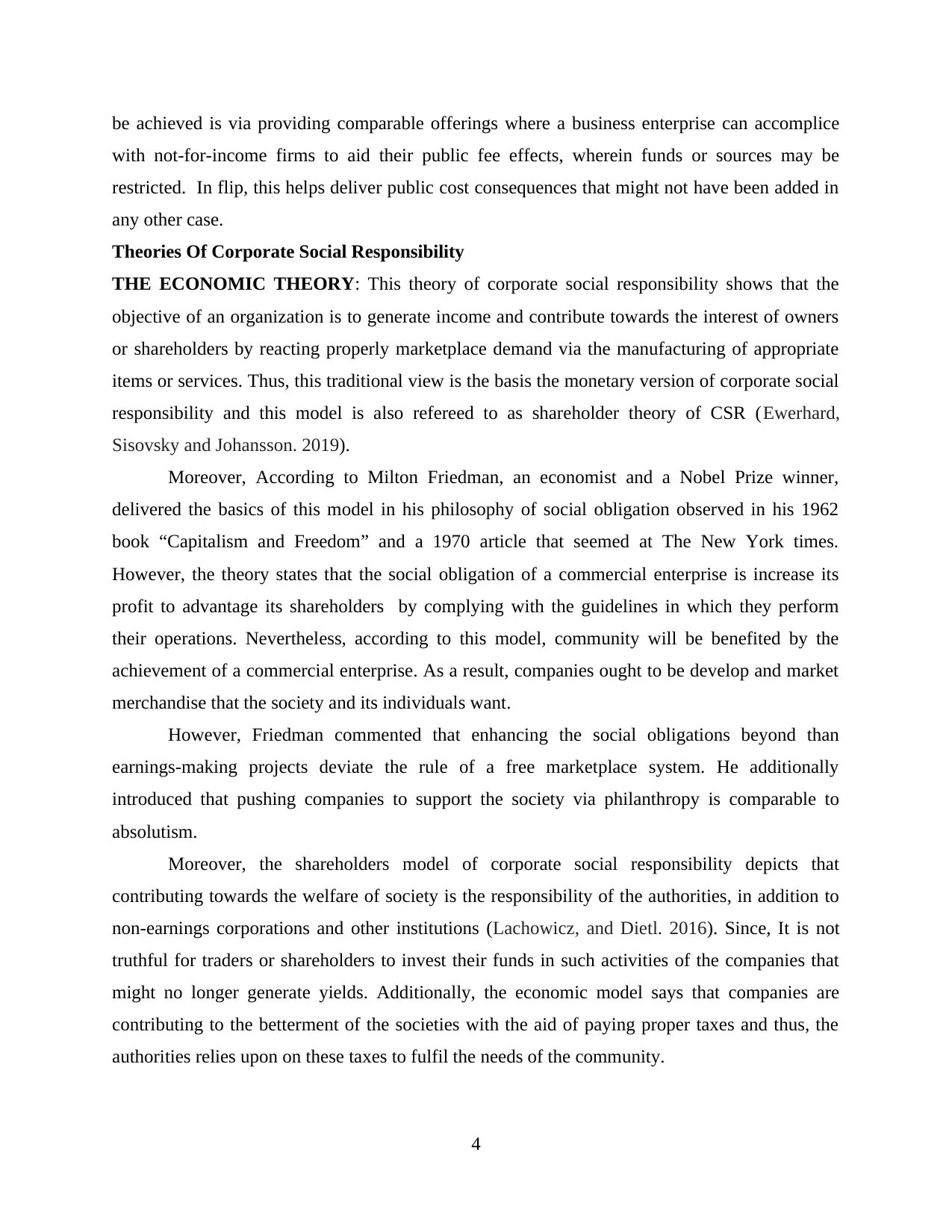
be achieved is via providing comparable offerings where a business enterprise can accomplice
with not-for-income firms to aid their public fee effects, wherein funds or sources may be
restricted. In flip, this helps deliver public cost consequences that might not have been added in
any other case.
Theories Of Corporate Social Responsibility
THE ECONOMIC THEORY: This theory of corporate social responsibility shows that the
objective of an organization is to generate income and contribute towards the interest of owners
or shareholders by reacting properly marketplace demand via the manufacturing of appropriate
items or services. Thus, this traditional view is the basis the monetary version of corporate social
responsibility and this model is also refereed to as shareholder theory of CSR (Ewerhard,
Sisovsky and Johansson. 2019).
Moreover, According to Milton Friedman, an economist and a Nobel Prize winner,
delivered the basics of this model in his philosophy of social obligation observed in his 1962
book “Capitalism and Freedom” and a 1970 article that seemed at The New York times.
However, the theory states that the social obligation of a commercial enterprise is increase its
profit to advantage its shareholders by complying with the guidelines in which they perform
their operations. Nevertheless, according to this model, community will be benefited by the
achievement of a commercial enterprise. As a result, companies ought to be develop and market
merchandise that the society and its individuals want.
However, Friedman commented that enhancing the social obligations beyond than
earnings-making projects deviate the rule of a free marketplace system. He additionally
introduced that pushing companies to support the society via philanthropy is comparable to
absolutism.
Moreover, the shareholders model of corporate social responsibility depicts that
contributing towards the welfare of society is the responsibility of the authorities, in addition to
non-earnings corporations and other institutions (Lachowicz, and Dietl. 2016). Since, It is not
truthful for traders or shareholders to invest their funds in such activities of the companies that
might no longer generate yields. Additionally, the economic model says that companies are
contributing to the betterment of the societies with the aid of paying proper taxes and thus, the
authorities relies upon on these taxes to fulfil the needs of the community.
4
with not-for-income firms to aid their public fee effects, wherein funds or sources may be
restricted. In flip, this helps deliver public cost consequences that might not have been added in
any other case.
Theories Of Corporate Social Responsibility
THE ECONOMIC THEORY: This theory of corporate social responsibility shows that the
objective of an organization is to generate income and contribute towards the interest of owners
or shareholders by reacting properly marketplace demand via the manufacturing of appropriate
items or services. Thus, this traditional view is the basis the monetary version of corporate social
responsibility and this model is also refereed to as shareholder theory of CSR (Ewerhard,
Sisovsky and Johansson. 2019).
Moreover, According to Milton Friedman, an economist and a Nobel Prize winner,
delivered the basics of this model in his philosophy of social obligation observed in his 1962
book “Capitalism and Freedom” and a 1970 article that seemed at The New York times.
However, the theory states that the social obligation of a commercial enterprise is increase its
profit to advantage its shareholders by complying with the guidelines in which they perform
their operations. Nevertheless, according to this model, community will be benefited by the
achievement of a commercial enterprise. As a result, companies ought to be develop and market
merchandise that the society and its individuals want.
However, Friedman commented that enhancing the social obligations beyond than
earnings-making projects deviate the rule of a free marketplace system. He additionally
introduced that pushing companies to support the society via philanthropy is comparable to
absolutism.
Moreover, the shareholders model of corporate social responsibility depicts that
contributing towards the welfare of society is the responsibility of the authorities, in addition to
non-earnings corporations and other institutions (Lachowicz, and Dietl. 2016). Since, It is not
truthful for traders or shareholders to invest their funds in such activities of the companies that
might no longer generate yields. Additionally, the economic model says that companies are
contributing to the betterment of the societies with the aid of paying proper taxes and thus, the
authorities relies upon on these taxes to fulfil the needs of the community.
4
⊘ This is a preview!⊘
Do you want full access?
Subscribe today to unlock all pages.

Trusted by 1+ million students worldwide
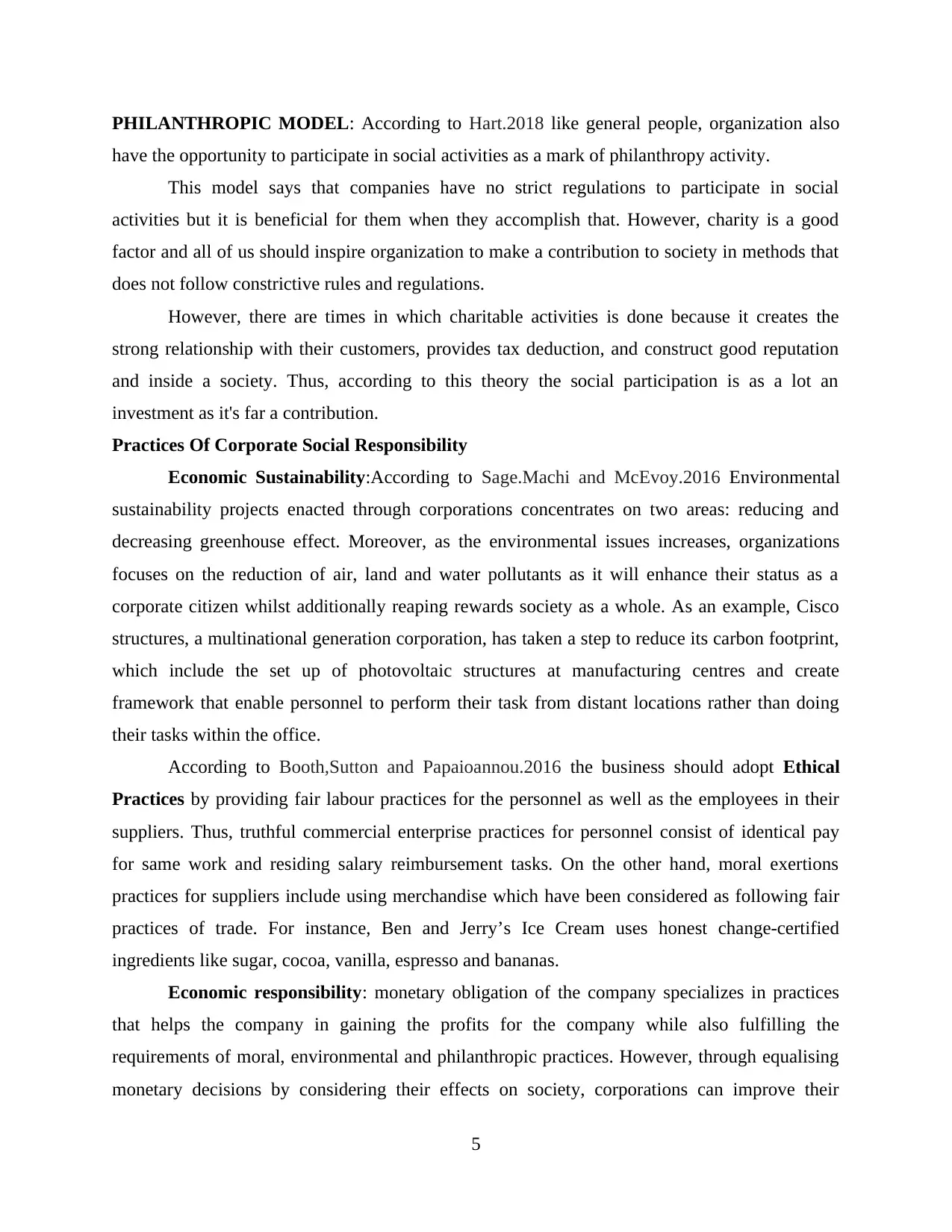
PHILANTHROPIC MODEL: According to Hart.2018 like general people, organization also
have the opportunity to participate in social activities as a mark of philanthropy activity.
This model says that companies have no strict regulations to participate in social
activities but it is beneficial for them when they accomplish that. However, charity is a good
factor and all of us should inspire organization to make a contribution to society in methods that
does not follow constrictive rules and regulations.
However, there are times in which charitable activities is done because it creates the
strong relationship with their customers, provides tax deduction, and construct good reputation
and inside a society. Thus, according to this theory the social participation is as a lot an
investment as it's far a contribution.
Practices Of Corporate Social Responsibility
Economic Sustainability:According to Sage.Machi and McEvoy.2016 Environmental
sustainability projects enacted through corporations concentrates on two areas: reducing and
decreasing greenhouse effect. Moreover, as the environmental issues increases, organizations
focuses on the reduction of air, land and water pollutants as it will enhance their status as a
corporate citizen whilst additionally reaping rewards society as a whole. As an example, Cisco
structures, a multinational generation corporation, has taken a step to reduce its carbon footprint,
which include the set up of photovoltaic structures at manufacturing centres and create
framework that enable personnel to perform their task from distant locations rather than doing
their tasks within the office.
According to Booth,Sutton and Papaioannou.2016 the business should adopt Ethical
Practices by providing fair labour practices for the personnel as well as the employees in their
suppliers. Thus, truthful commercial enterprise practices for personnel consist of identical pay
for same work and residing salary reimbursement tasks. On the other hand, moral exertions
practices for suppliers include using merchandise which have been considered as following fair
practices of trade. For instance, Ben and Jerry’s Ice Cream uses honest change-certified
ingredients like sugar, cocoa, vanilla, espresso and bananas.
Economic responsibility: monetary obligation of the company specializes in practices
that helps the company in gaining the profits for the company while also fulfilling the
requirements of moral, environmental and philanthropic practices. However, through equalising
monetary decisions by considering their effects on society, corporations can improve their
5
have the opportunity to participate in social activities as a mark of philanthropy activity.
This model says that companies have no strict regulations to participate in social
activities but it is beneficial for them when they accomplish that. However, charity is a good
factor and all of us should inspire organization to make a contribution to society in methods that
does not follow constrictive rules and regulations.
However, there are times in which charitable activities is done because it creates the
strong relationship with their customers, provides tax deduction, and construct good reputation
and inside a society. Thus, according to this theory the social participation is as a lot an
investment as it's far a contribution.
Practices Of Corporate Social Responsibility
Economic Sustainability:According to Sage.Machi and McEvoy.2016 Environmental
sustainability projects enacted through corporations concentrates on two areas: reducing and
decreasing greenhouse effect. Moreover, as the environmental issues increases, organizations
focuses on the reduction of air, land and water pollutants as it will enhance their status as a
corporate citizen whilst additionally reaping rewards society as a whole. As an example, Cisco
structures, a multinational generation corporation, has taken a step to reduce its carbon footprint,
which include the set up of photovoltaic structures at manufacturing centres and create
framework that enable personnel to perform their task from distant locations rather than doing
their tasks within the office.
According to Booth,Sutton and Papaioannou.2016 the business should adopt Ethical
Practices by providing fair labour practices for the personnel as well as the employees in their
suppliers. Thus, truthful commercial enterprise practices for personnel consist of identical pay
for same work and residing salary reimbursement tasks. On the other hand, moral exertions
practices for suppliers include using merchandise which have been considered as following fair
practices of trade. For instance, Ben and Jerry’s Ice Cream uses honest change-certified
ingredients like sugar, cocoa, vanilla, espresso and bananas.
Economic responsibility: monetary obligation of the company specializes in practices
that helps the company in gaining the profits for the company while also fulfilling the
requirements of moral, environmental and philanthropic practices. However, through equalising
monetary decisions by considering their effects on society, corporations can improve their
5
Paraphrase This Document
Need a fresh take? Get an instant paraphrase of this document with our AI Paraphraser
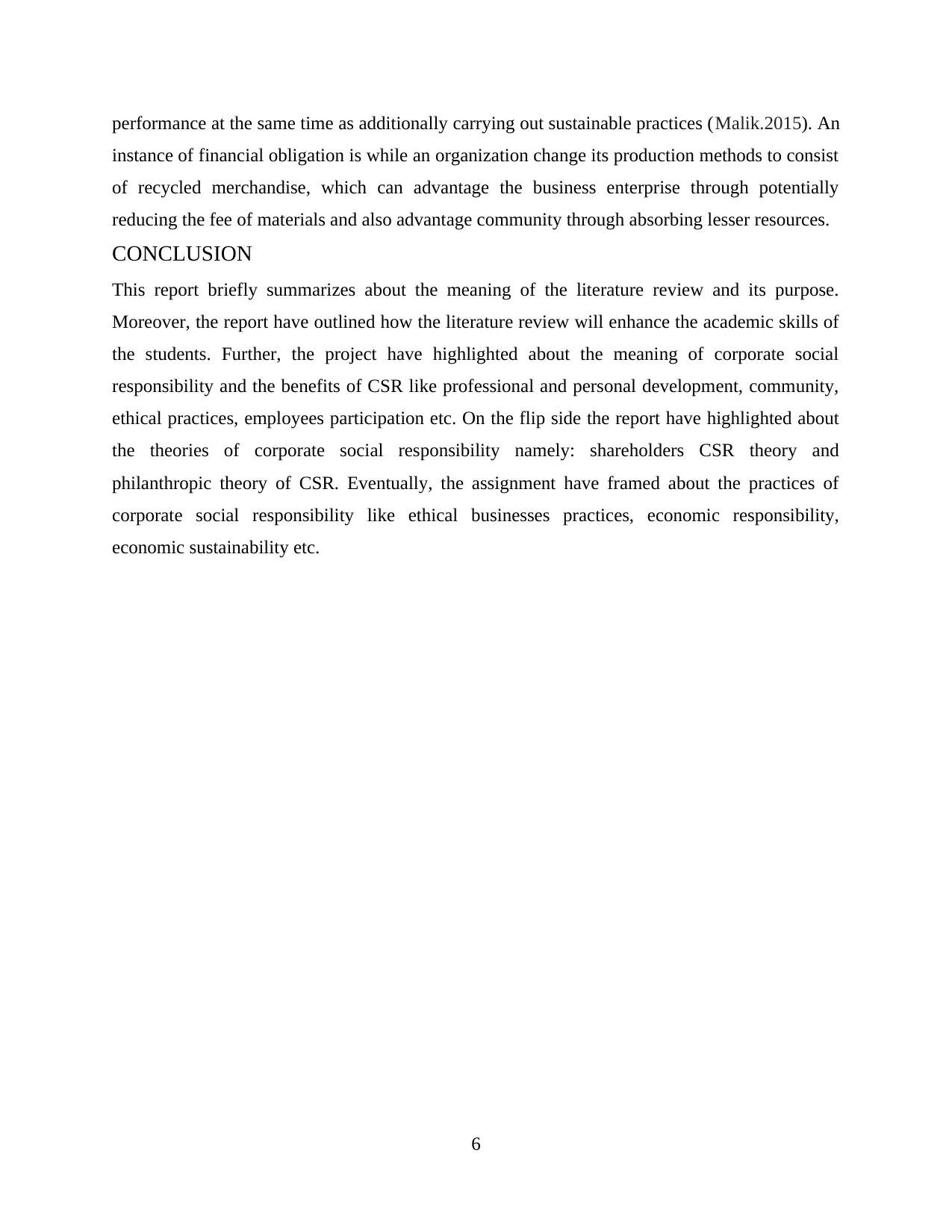
performance at the same time as additionally carrying out sustainable practices (Malik.2015). An
instance of financial obligation is while an organization change its production methods to consist
of recycled merchandise, which can advantage the business enterprise through potentially
reducing the fee of materials and also advantage community through absorbing lesser resources.
CONCLUSION
This report briefly summarizes about the meaning of the literature review and its purpose.
Moreover, the report have outlined how the literature review will enhance the academic skills of
the students. Further, the project have highlighted about the meaning of corporate social
responsibility and the benefits of CSR like professional and personal development, community,
ethical practices, employees participation etc. On the flip side the report have highlighted about
the theories of corporate social responsibility namely: shareholders CSR theory and
philanthropic theory of CSR. Eventually, the assignment have framed about the practices of
corporate social responsibility like ethical businesses practices, economic responsibility,
economic sustainability etc.
6
instance of financial obligation is while an organization change its production methods to consist
of recycled merchandise, which can advantage the business enterprise through potentially
reducing the fee of materials and also advantage community through absorbing lesser resources.
CONCLUSION
This report briefly summarizes about the meaning of the literature review and its purpose.
Moreover, the report have outlined how the literature review will enhance the academic skills of
the students. Further, the project have highlighted about the meaning of corporate social
responsibility and the benefits of CSR like professional and personal development, community,
ethical practices, employees participation etc. On the flip side the report have highlighted about
the theories of corporate social responsibility namely: shareholders CSR theory and
philanthropic theory of CSR. Eventually, the assignment have framed about the practices of
corporate social responsibility like ethical businesses practices, economic responsibility,
economic sustainability etc.
6
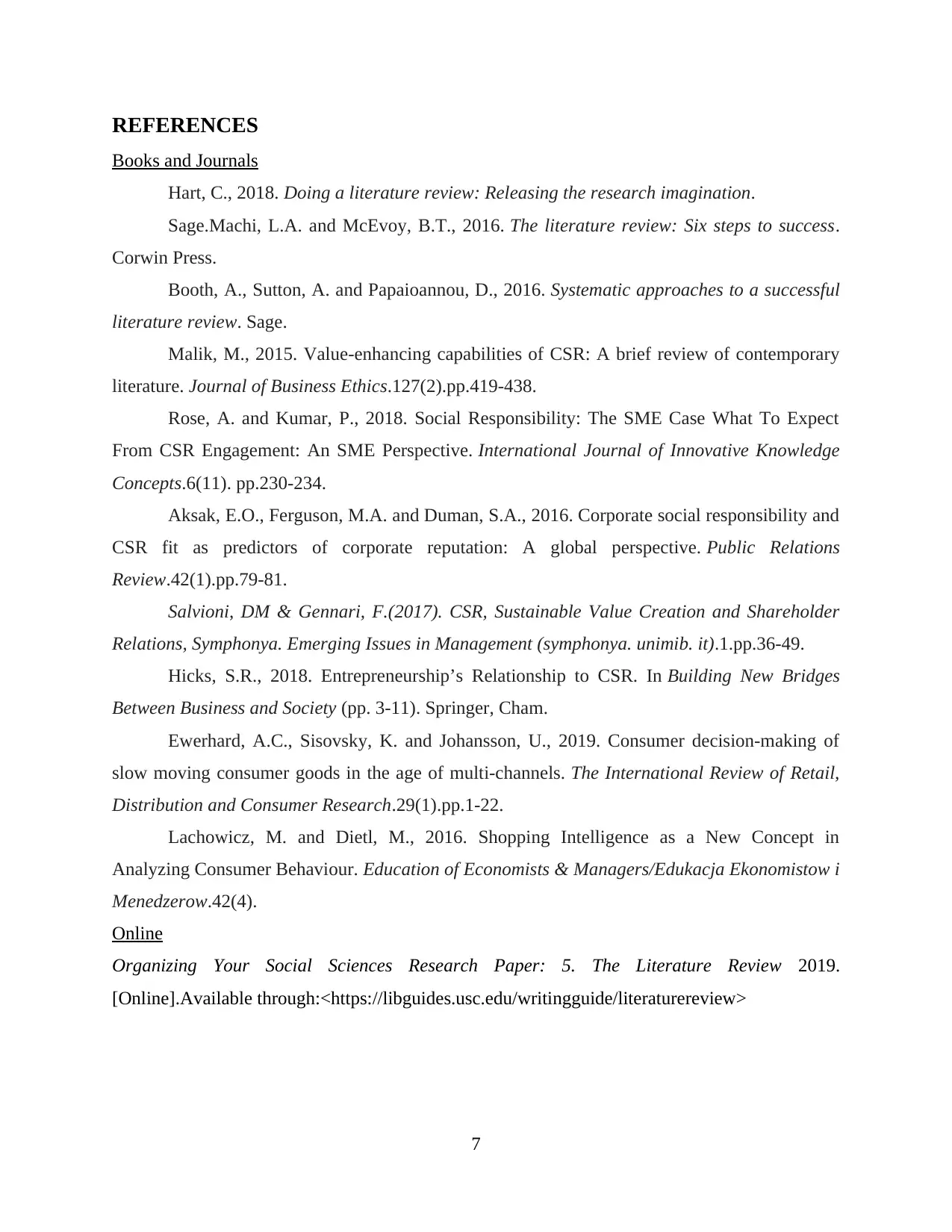
REFERENCES
Books and Journals
Hart, C., 2018. Doing a literature review: Releasing the research imagination.
Sage.Machi, L.A. and McEvoy, B.T., 2016. The literature review: Six steps to success.
Corwin Press.
Booth, A., Sutton, A. and Papaioannou, D., 2016. Systematic approaches to a successful
literature review. Sage.
Malik, M., 2015. Value-enhancing capabilities of CSR: A brief review of contemporary
literature. Journal of Business Ethics.127(2).pp.419-438.
Rose, A. and Kumar, P., 2018. Social Responsibility: The SME Case What To Expect
From CSR Engagement: An SME Perspective. International Journal of Innovative Knowledge
Concepts.6(11). pp.230-234.
Aksak, E.O., Ferguson, M.A. and Duman, S.A., 2016. Corporate social responsibility and
CSR fit as predictors of corporate reputation: A global perspective. Public Relations
Review.42(1).pp.79-81.
Salvioni, DM & Gennari, F.(2017). CSR, Sustainable Value Creation and Shareholder
Relations, Symphonya. Emerging Issues in Management (symphonya. unimib. it).1.pp.36-49.
Hicks, S.R., 2018. Entrepreneurship’s Relationship to CSR. In Building New Bridges
Between Business and Society (pp. 3-11). Springer, Cham.
Ewerhard, A.C., Sisovsky, K. and Johansson, U., 2019. Consumer decision-making of
slow moving consumer goods in the age of multi-channels. The International Review of Retail,
Distribution and Consumer Research.29(1).pp.1-22.
Lachowicz, M. and Dietl, M., 2016. Shopping Intelligence as a New Concept in
Analyzing Consumer Behaviour. Education of Economists & Managers/Edukacja Ekonomistow i
Menedzerow.42(4).
Online
Organizing Your Social Sciences Research Paper: 5. The Literature Review 2019.
[Online].Available through:<https://libguides.usc.edu/writingguide/literaturereview>
7
Books and Journals
Hart, C., 2018. Doing a literature review: Releasing the research imagination.
Sage.Machi, L.A. and McEvoy, B.T., 2016. The literature review: Six steps to success.
Corwin Press.
Booth, A., Sutton, A. and Papaioannou, D., 2016. Systematic approaches to a successful
literature review. Sage.
Malik, M., 2015. Value-enhancing capabilities of CSR: A brief review of contemporary
literature. Journal of Business Ethics.127(2).pp.419-438.
Rose, A. and Kumar, P., 2018. Social Responsibility: The SME Case What To Expect
From CSR Engagement: An SME Perspective. International Journal of Innovative Knowledge
Concepts.6(11). pp.230-234.
Aksak, E.O., Ferguson, M.A. and Duman, S.A., 2016. Corporate social responsibility and
CSR fit as predictors of corporate reputation: A global perspective. Public Relations
Review.42(1).pp.79-81.
Salvioni, DM & Gennari, F.(2017). CSR, Sustainable Value Creation and Shareholder
Relations, Symphonya. Emerging Issues in Management (symphonya. unimib. it).1.pp.36-49.
Hicks, S.R., 2018. Entrepreneurship’s Relationship to CSR. In Building New Bridges
Between Business and Society (pp. 3-11). Springer, Cham.
Ewerhard, A.C., Sisovsky, K. and Johansson, U., 2019. Consumer decision-making of
slow moving consumer goods in the age of multi-channels. The International Review of Retail,
Distribution and Consumer Research.29(1).pp.1-22.
Lachowicz, M. and Dietl, M., 2016. Shopping Intelligence as a New Concept in
Analyzing Consumer Behaviour. Education of Economists & Managers/Edukacja Ekonomistow i
Menedzerow.42(4).
Online
Organizing Your Social Sciences Research Paper: 5. The Literature Review 2019.
[Online].Available through:<https://libguides.usc.edu/writingguide/literaturereview>
7
⊘ This is a preview!⊘
Do you want full access?
Subscribe today to unlock all pages.

Trusted by 1+ million students worldwide
1 out of 9
Related Documents
Your All-in-One AI-Powered Toolkit for Academic Success.
+13062052269
info@desklib.com
Available 24*7 on WhatsApp / Email
![[object Object]](/_next/static/media/star-bottom.7253800d.svg)
Unlock your academic potential
Copyright © 2020–2025 A2Z Services. All Rights Reserved. Developed and managed by ZUCOL.





